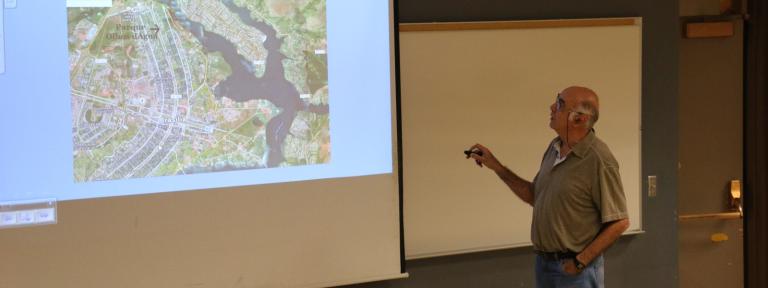
“Getting the knowledge of different laboratories, different structures and different technologies helps students. You can also exchange ideas and that improves the academic process as well.”
| Dr. Aderbal Oliveira is working with Kettering faculty on cancer research. |
A collaboration that stretches across continents in the western hemisphere between Kettering University and the University of Brazilia in Brazilia, Brazil, is fueling non-invasive cancer research related to magnetic nanoparticles on both campuses. Since 2007, Dr. Aderbal Oliveira from Brazilia has collaborated with Dr. Prem Vaishnava at Kettering on how best to construct and manipulate magnetic nanoparticles for cancer treatment. They published their first paper together in 2009.
“The biggest benefit of collaborating is the knowledge gained,” Oliveira said. “Getting the knowledge of different laboratories, different structures and different technologies helps students. You can also exchange ideas and that improves the academic process as well.”
Specifically, Oliveira and Vaishnava have been working together on developing a technique called Photoacoustic Spectroscopy. This process attacks a material with electromagnetic radiation which results in heating and expansion of the subject matter. The resulting expansion produces shockwaves which can kill cancer cells.
“The biggest problem is controlling the size of the magnetic nanoparticles that are heated,” Oliveira said. “The big advancement is to control the size so you can target and use the magnetic nanoparticles.”
Additionally, the researchers are using Mossbauer Spectroscopy to measure behavioral changes of magnetic nanoparticles which has proven cumbersome in the United State due to heightened security surrounding radioactive materials.
“Our nuclear regulatory commission has become very strict,” Vaishnava said. “We had that capability here but they took our sources away. This is another reason why we collaborate with Brazilia.”
Through the years of collaboration the relationship between the two universities has also evolved from cancer research to lithium ion batteries that are commonly found in cell phones and other wireless electronic devices. Peru is South America’s greatest supplier of lithium yet Brazil lacks a large-scale producer or distributor of lithium-ion batteries.
“This is a great opportunity for Kettering University to help them establish an entrepreneurial venture to produce lithium ion batteries,” Vaishnava said.
Vaishnava visited the University of Brazilia in 2013 and this past summer Oliveira came to Kettering to continue the collaboration. Oliveira currently has five research students working for him in Brazilia but both he and Vaishnava hope that cooperative relationship between the two universities will continue to grow and eventually involve study-abroad opportunities for both countries.
“The collaboration is important for both sides as far as exchanging ideas and exchanging people,” Oliveira said. “People seeing another atmosphere and culture and another way of thinking is invaluable. This opens up their minds to new way of thinking and new projects.”